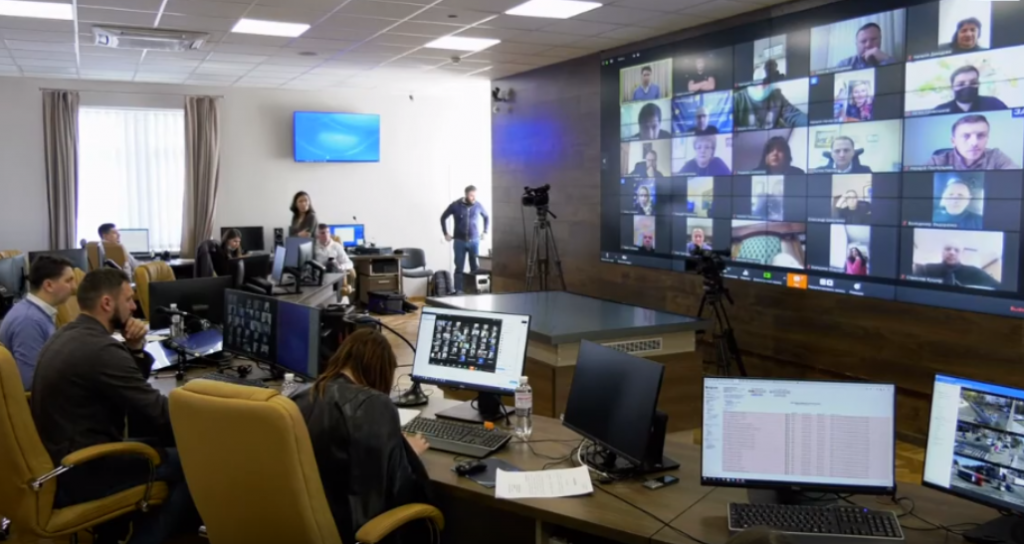As Ukraine grapples with the global coronavirus pandemic, local authorities are demonstrating creativity by moving their administrations online to allow for continuity of city government amid lockdown conditions. The switch has now been backed by legislative changes at the national level, paving the way for more municipal and regional authorities to follow suit in the weeks ahead.
When the first Ukrainian city councils began adopting coronavirus quarantine measures to introduce the possibility of online administration, they found themselves in breach of existing national legislation. Prior to the coronavirus outbreak, Ukrainian law stated that any decisions passed by councils while meeting outside of the physical city council building could potentially be overturned by a court ruling. Ukrainian lawmakers in Kyiv moved quickly to address this imbalance and reconcile the need to move local government institutions online while allowing them to maintain the same levels of authority.
The necessary legislation was passed on March 30 during an extraordinary session of the Ukrainian parliament. In line with law No. 3275, Ukrainian local councils will now be able to function online during the period of national emergency and coronavirus quarantine. The law received strong cross-party support and was voted for by around three-quarters of MPs. Supporters see it as another step towards responsive local democracy in the country.
Stay updated
As the world watches the Russian invasion of Ukraine unfold, UkraineAlert delivers the best Atlantic Council expert insight and analysis on Ukraine twice a week directly to your inbox.
In order to hold a session of the city council online, a number of actions must first take place. The decision to conduct an online plenary meeting of a city council should be made public in advance on the official website of the council. This posting should include the agenda of the planned meeting. Information about the city council session should be made public to both council members and the public no later than at least 24 hours before the beginning of the session. This announcement should indicate the procedures of access to this online meeting. Additionally, recording the meeting must be a part of the permanent protocol of the session and must include any decisions passed.
In the weeks ahead, one of the key challenges for many Ukrainian municipal authorities will be the need to pass the necessary local decisions and introduce procedures to facilitate the move to an online format of operations. Issues such as training for staff to teach them how to use webinar technology, along with the availability and cost of online communications services, will also need to be addressed. Larger cities are better positioned to move quickly on these issues than many of Ukraine’s smaller towns and villages, but it is equally relevant for all local authorities as the country confronts an extended period of nationwide quarantine.
Many of Ukraine’s best administration ideas and successful initiatives initially tend to take place at the local level. This usually occurs in a vacuum with little national effort to link the innovations of different towns and cities. The same is currently true for individual efforts to introduce online administration during the coronavirus crisis. Looking ahead, this will create opportunities for city councils to enhance communication and learn from their early adopter peers who are already passing local legislation and gaining experience of online administration.
Eurasia Center events

A good example of this is Dnipro. The central Ukrainian city reacted quickly to the governance gap caused by coronavirus quarantine, passing a number of decisions to allow the municipal authorities to work online as effectively as possible within the limits of existing legislation prior to this week’s changes. With the required legislation now in place, Dnipro is well-positioned to hit the ground running and should become a model for other Ukrainian towns and cities looking to quickly replicate the steps adopted by Dnipro in order to move administration online.
Stronger links between different towns and cities can help local authorities throughout Ukraine in the fight to stem the impact of the coronavirus crisis. Following the pandemic, the speedy economic recovery of cities and municipalities will be equally important. Many of the lessons learned and shared linkages between different Ukrainian cities could aid and accelerate that recovery.
By strengthening local government institutions through online innovation at this time of global crisis, Ukraine stands in stark contrast to the shift towards authoritarianism and increasingly centralized powers evident elsewhere in the region. Enabling local authorities to operate online can boost both efficiency and transparency. It may not have the headline-making power of multi-billion dollar IMF packages and historic land reform legislation, but it is another milestone in Ukraine’s inclusive democratic development.
Michael Druckman is resident program director for Ukraine at the International Republican Institute.
Further reading
The views expressed in UkraineAlert are solely those of the authors and do not necessarily reflect the views of the Atlantic Council, its staff, or its supporters.

The Eurasia Center’s mission is to enhance transatlantic cooperation in promoting stability, democratic values and prosperity in Eurasia, from Eastern Europe and Turkey in the West to the Caucasus, Russia and Central Asia in the East.
Follow us on social media
and support our work
Image: Creative solutions to coronavirus quarantine: a recent online session of the Dnipro City Council (screenshot via Pro Dnipro)




